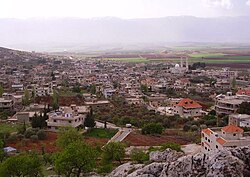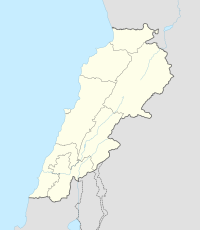Kamid al lawz
|
Kamed Al Lawz كامد اللوز |
|
|---|---|
| City | |
 |
|
| Country |
|
| Governorate | Beqaa Governorate |
| District | Western Beqaa District |
| Population | |
| • Total | 6,000 |
| Time zone | EET (UTC+2) |
| • Summer (DST) | EEST (UTC+3) |
| Dialing code | +961 |
| Alternate name | Kamid el-Loz |
|---|---|
| Location | Beqaa Valley, Lebanon |
| Coordinates | 33°36′58″N 35°48′58″E / 33.616°N 35.816°E |
| Type | Tell |
| Part of | Settlement |
| History | |
| Periods | Neolithic, Chalcolithic, Byzantine |
| Cultures | Persian, Hellenistic, Roman |
| Site notes | |
| Condition | ruins |
| Public access | Yes |
Kamid al lawz (or Kamid el-Loz) is located in West Bekaa, Lebanon. Its population numbers several thousand, mostly Sunni, people.
This town was the site of major German archaeological excavations between 1963 and 1981. One of the most important sites in Lebanon where archaeologists found and recorded many spectacular buildings, which are very important to the history of the region. Paleolithic material was found alongside Heavy Neolithic on through to the late Neolithic period, becoming a seat of state in the Bronze Age and continuing until the Byzantine era, a German team from the University of Freiburg has conducted more recent excavations and studies.
Numerous urban structures such as defense systems, temples, palaces, private dwellings, workshops and cemeteries were uncovered. Archaeologists also found everyday objects such as pottery, as well as jewelry and other luxury items.
Probably the most important finds were documents written in cuneiform on clay tablets dated to the 14th century BC. The village of Kamed el-Loz lies on top of settlements built in the Persian, Hellenistic and Roman periods. The site has been determined to be the city of Kumidi in the Amarna letters. It was used as a residence to Egyptian officials to oversee the southern Levantine kings for the pharaoh.
South of the village we find a necropolis or burial place that also dates to this era. Just outside Kamed-El-Loz is a large Umayyad quarry visible from the road. Rock-cut tombs can be seen here, as well as Aramaic inscriptions. The quarry provided stones for the 8th century city of Anjar and was worked by Nestorian Christians from Iraq who were brought to the Beqaa for this purpose.
...
Wikipedia

